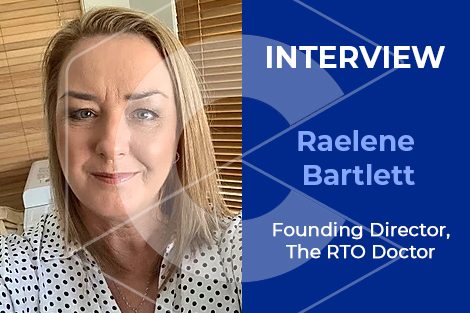Raelene is the author of two best-selling books, CRICOS CPR: Top 5 Tips to Rescue Your RTO and Legal Decision-Making under the National Vocational Education and Training Regulator Act 2011 (Cth): An investigation into merits review. As one of Australia’s leading sanction management specialists in VET and international education, she is well known for her outspoken and informed contributions to discussion around VET reform, calling out negligence and keeping the sector accountable. As an ex-regulator, she was an integral to the CRICOS national re-registration project in 2009-2010 which saw the closure of a number of high-profile providers around the country. An outspoken advocate for the sector, Raelene often provides informed discussions on topics that are critical to the future of VET in Australia.

Q1: For those who do not know you, what is your background?
I completed a Bachelor of Education majoring in law and health, completed a Master of Education (Research) in youth suicide prevention, a Graduate Diploma in Adolescent Health and Welfare, as well as a range of VET qualifications in auditing and TAE. I started a Doctor of Philosophy at Monash University in Melbourne on international student safety several years ago but withdrew when I moved to WA. I completed a Graduate Diploma in Australian Migration Law and Practice last year and am currently completing a Bachelor of Laws (Graduate Entry).
From a career perspective, I’ve been a mainstream high school teacher, I worked in prison education, with non-mainstream youth at risk (homeless teens, pregnant teens, kids whose parents were in and out of jail, kids with dual diagnosis issues). I’ve been a VET Trainer and assessor (health and community services), set up health and community services portfolios in large RTOs, managed RTOs, been a regulator with the Department of Education Services in International and Higher Education Regulation and established RTO Doctor in February 2011.
I’ve always been involved in advocacy issues within the VET sector, probably my first real issue that I advocated heavily for in VET was a long time ago in Victoria with ACPET in relation to the issue of work based training for international students. The issues were two-fold. The first was around the requirement of some skills assessment bodies that required certain qualifications and work based training for successful completion or recognition. This really only impacted international students seeking permanent residency at the time because Australian employees did not (and still do not) have to meet the same criteria to be eligible to work in those industries. The second issue was related to how completing the mandatory work placement in these courses impacted international students and their right to work in Australia while their course was in session. There were many courses at the time which required a certain number of work placement hours for recognition of the qualification for international students (domestic students didn’t need to have their qualification recognised) but the training package didn’t require it so, under the National Code at the time, these work based training hours could not be registered n CRICOS causing conflict with the right of international students to work.
Q2: What motivated you to work in an industry which includes a lot of auditing, compliance and many regulations?
Initially, I was motivated by the work I was doing in my PhD. It was on international student safety and how the General Skilled Migration (GSM) Program victimises international students, also focussing on how their own desire to study in Australia contributed to their future victimisation (not so much focussing on the physical violence being experienced at the time ut how systems were exploiting international students and how they willingly engaged with those exploitative systems knowing the inherent risks). I was concerned that if these international students were coming to Australia to study in a country so far from home and where everything is foreign and unknown to them prior to their arrival, then I could at least contribute to the quality of that experience by ensuring that providers were consistently compliant and met their obligations. I’ve always been interested in victimology and supporting the weak, this was just another example.
One day I realised that I could only ever have a small impact by challenging the system in this manner and that if I was to have a bigger impact, I needed to come at it from a different perspective and so came my time as a regulator. The idea was that if I could show providers how to do the right thing, my impact would be greater. I realised though that there was a far greater impact that could be made by assisting providers to respond to allegations of non-compliant behaviour and that perhaps there were secondary victims of the GSM program – providers themselves. As time has gone by and the regulatory framework has changed, my passion for justice and the law has meant that I quite naturally came to specialise in AAT work, giving hope to providers who have risked everything to leave a legacy for our future generations and who, in this process, have become oppressed with very options for survival.
Q3: In the current environment what do you think are the main threats to training organisations?
I think there are a number of threats to RTOs including a lack of leadership and policy direction, financial viability, the inability to exist and operate as a viable long-term business, a rogue regulator, no real industry association that is truly representative of the private sector, the race to the bottom for survival, the lack of regulation around VET service providers (consultants, accountants, website developers, AVETMISS suppliers – there are more and more establishing themselves all the time, most who do not have the qualifications or experience to provide the services that they do; this is a consistent threat to providers in what has become one of the most poorly and highly regulated sectors in the international economy. Australian politics is also a major threat to not just training organisations but Australia’s education and training industry. Australian politics has for decades just put bandaids on a system that it has never understood and the bandaids just keep falling off. If the government is to truly reform Australia’s VET sector, it needs to have a better understanding of it and engage with experts who do.
Q4: What are your views on how we can improve the vocational education and training sector in Australia?
See the previous question, I could turn this into another book otherwise!
Q5: What is your message to organisations that do not spend money or time on improving their systems, processes and staff?
My views are a bit unconventional really. I think there are 2 categories of providers here. I think many providers do spend time and money on these things but they don’t know what they don’t know and are often misguided and exploited by unethical and/or unqualified or poor quality VET service providers. Some of these providers offer these services willingly and intentionally knowing they don’t meet the mark, others are just too naive (or ego-driven) to step aside when they are out of their depth. What makes it worse is the regulator is incredibly poor at providing any guidance on their expectations; it operates in a context of you are guilty until you prove yourself innocent. In this context, it’s impossible to pre-empt what the regulator expects, especially when they are so inconsistent and secondly, despite the many iterations of the legislative framework RTOs operate under, there is still so much grey. This leads me to my second group of providers who, understand that we operate in a legislative framework and sometimes, all you can do is meet the minimum requirements and do what you think. If you have the unfortunate experience of coming face to face with ASQA in its current state, you adjust your systems at that point in time to suit their expectations where it is reasonable. Ultimately, a provider can send themselves into bankruptcy these days trying to pre-empt what ASQA wants and still not get there. Given that they have to make legal decisions based on the legislative framework we all have to operate under, sometimes, it is more time and cost-effective to wait for the legal decision to be made and take action from there. With there being so much subjectivity that prevails in ASQA’s intentions, interpretations, poor quality and approaches to regulation that are not robust, accountable or transparent, it wouldn’t matter how much time or money a provider spent on improving their systems, processes and staff, it would, in today’s regulatory climate, still not be enough.
Q6: What are your views on the comparison between public and private training providers?
I think that if public providers were held to account as much or even close to private providers, there would be no public providers. Having been involved with numerous public providers over the years, I can honestly say that they have far more compliance issues than the majority of private RTOs. I’ve seen some truly horrific accounts of non-compliance in public RTOs that the public would be horrified about but it often gets swept under the carpet. Then there’s those public providers who have connections…
Ultimately, one government body will never shut down another government body – there’s a lot in that if you read between the lines.
Q7: What message would you like to convey to people who plan to work in the VET Sector or are in the industry but do not know where to find help and support?
When people come to me asking for assistance or advice on entering into the VET sector or becoming an RTO, I am ashamed to say that I often ask them ‘Are you mad’? ‘Are you really sure you want to do this’? I actually try to talk them out of it. When you see the horror stories that I have in this industry, the lives that ASQA has ruined, the number of people who have lost everything – their homes, their car, their family, their health, you really start to question the future of this industry and what lies ahead as long as we have the corruption, lack of leadership, transparency, honesty and lack of policy direction that we do. I am fearful for Australia’s VET sector; I’m fearful for the mess that these governments (both Labour and Liberal) have created, neglected and failed. I’m afraid for our future generations and their ability to access the skills that they need to survive in a world that is demanding more and more technical and vocational education. I’m afraid for Australia’s services, suffering immense skills shortages because it’s just too hard to train people to fill those roles or remuneration is not commensurate with what it takes to even graduate one person to fill that gap. As for finding help and support, I have always said ‘Buyer Beware’. There’s a lot of inexperience out there and you don’t know what you don’t know. Don’t be fooled, the mistakes are often life-changing but never in the way you expected.
Higher Education Consultants you can trust!




